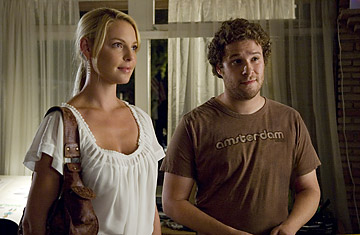
Katherine Heigl and Seth Rogen in Knocked Up
By rights, Judd Apatow should be a terrible filmmaker. His movies largely feature his friends and family, which is usually an invitation to lazy inside-joking. His subjects tend to be none-too-bright slackers and losers, which always carries with it the possibility of tiresome indulgence. OK, they're kinda dumb, but, really, isn't there something adorable in their stupidity? The fact is, however, Apatow, represents, for the moment at least, the best in American movie comedy. The 40 Year-Old Virgin somehow made rather touching and funny sense out of that eponymous condition and its protagonist's recovery from it. Now Knocked Up does much the same thing for a much more common situation — the inconvenient consequences of a one-night stand.
Alison (Katherine Heigl) and her sister Debbie (Leslie Mann) are out clubbing, celebrating the former's promotion from stage manager on one of those Inside Hollywood TV shows to an on-air job. There they meet the overweight, unemployed Ben (Seth Rogin). She's giddy with happiness (and a certain amount of booze) and they retire to her place — it's the guest house at her sister's nice middle-class home — and have unsafe and unsatisfactory sex. He's hopeful of a relationship; she's hopeful of never seeing him again. Many distressing pregnancy tests later, they both have to come to terms with impending parenthood, which, of course, involves actually getting to know one another. This, they awkwardly do.
As a movie premise, it's about as simple as they come. What transforms it into something quite wonderful to see is that Apatow, unlike those teams that fashion comedies for the young and retarded, is a real writer — one with something on his mind other than barf jokes and public flatulence (though he includes a few such moments here). He knows how to write funny, "he said, she said" jokes. More important, he's a tender observer of ordinary life. Think of him, perhaps, as a throwback to the kind of screenwriters who created the classic romantic comedies of the 1930s.
Which is not to say that his topic is rich ninnies who somehow stumble through confusion to blissful amour. His people are much more ordinary than that. Take Ben for example. He lives in a nest of nerds on the dwindling remains of a long-ago court settlement. They suck on bongs and beer bottles, vaguely plan a website that will direct readers to skin scenes in movies — not knowing, of course, that it's an already overcrowded field — and dream of dreamgirls they lack the social skills to approach in real life. But if their development is arrested, they are not really bad sorts. And that's where Alison comes in.
She's a little bit dim herself, and possibly affected by her close proximity to her sister's situation. Debbie is a faithful wife who's reached that awkward age where guys are no longer hitting on her. Worse, her husband (Paul Rudd) is withdrawing from her. She thinks he's having an affair, but he's not. What he's sneaking out of the house in search of is quiet male bonding — evenings with the guys that lack the shrillness of his wife's (and kids) restlessness.
Another way of saying this is that he film's central reversal — Ben and Alison getting to know, and like, one another after their first hasty but consequential encounter — is rendered plausible by Apatow's shrewd observations of the people in their lives. Indeed, one of the real pleasures of this movie is derived from the fact that Apatow writes his minor characters — a TV host, a wardrobe mistress, a slyly envious production executive — with the same care and wit as he does his major figures.
The course of pregnancy runs no smoother than the course of true love, and Apatow's obstetrical observations — yes, natural childbirth devotees may well call for painkillers when labor becomes more intense than advertised — are shrewd and edgy. And Alison's hormonally induced moodiness, as well as Ben's slouching progress toward grown-up status, are craftily presented. But for all his hipness and Hollywood hotness, Apatow is, at heart, a square. He clearly believes in marriage, family, bourgeois dutifulness. Maybe his movie is a little repetitive, but that's a negligible price to pay for the careful blending of wildness and good humor that went into its making. It's hard enough to find comedies like this at any time, so it's a small and welcome miracle to come upon one in the midst of a typical movie summer, richer than ever in over-budgeted, underwhelming inanities.
